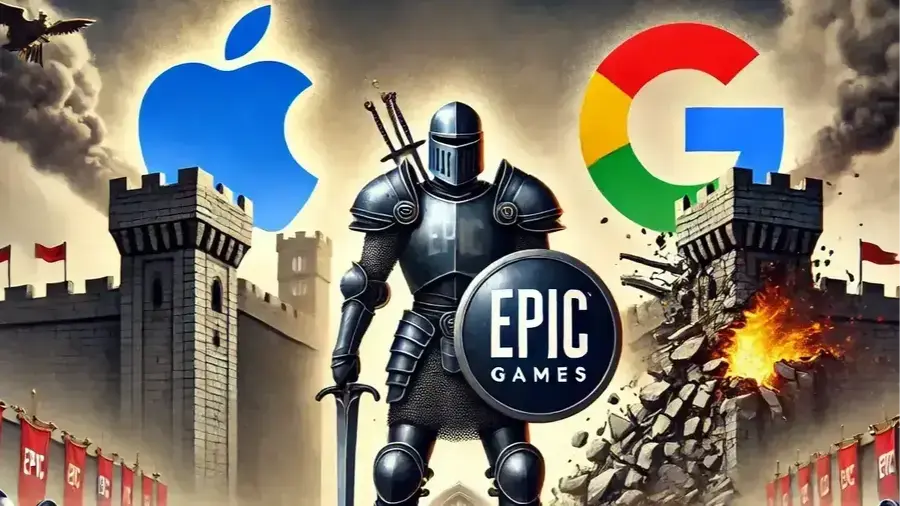On October 7th 2024, Tim Sweeney of Epic Games posted on X, “Big news! The Epic Games Store and other app stores are coming to the Google Play Store in 2025 in the USA - without Google's scare screens and Google's 30% app tax - thanks to victory in Epic v Google.” This is the latest victory in a wide-ranging battle to dismantle the app store duopoly of Apple and Google. This blog gives an overview of what is happening worldwide and where it will likely all end.
I will summarize the current state of all the relevant lawsuits and regulations and argue that Apple and Google are fighting a losing battle to protect their monopolistic behavior.
Let’s dive in and take a look first at the most recent success of Epic Games.
Breaking News: Epic Won Against Google (For Now)
Following the previous jury verdict in the case against Google in December 2023, in October 2024 the judge in the case issued an injunction to force Google to give Android users the right to more options to download apps and other ways to pay for transactions within them.
Epic Games started the lawsuit in August 2020, suing Apple on the same day (more on that later). In both cases Epic demanded fair competition in mobile app distribution and in-app payment.
Before this, both tech companies had removed Fortnite from their app stores after Epic tried to implement its own payment system to bypass the monopoly on in-app payments and the percentage taken by Google and Apple App stores for such transactions.
The jury had found that Google violated US antitrust laws by:
- Holding an illegal monopoly on app distribution and in-app billing for Android devices
- Having anti-competitive deals with gaming companies and device manufacturers
The injunction forces Google to allow and make available alternative app stores on Android as well as allow apps to use alternate billing mechanisms instead of Google Play Billing. The injunction also prevents Google from using methods and payments to incent app developers to launch apps exclusively on Google Play or offer incentives not to compete with Google Play. Google has 8 months to implement the required changes.
It’s not yet clear whether Google will have to immediately follow the court’s demands, even though the permanent injunction will take effect November 1st. Google responded, pointing out that the outcome of the Epic case against Apple was very different. Google already promised to appeal the verdict, and is asking for an immediate stay on implementing the changes.
Google also raised the familiar argument that the required changes would put consumers’ privacy and security at risk, make it harder for developers to promote their apps, and reduce competition on devices.
In the ruling, Google will still have some control over safety and security as it opens up the Google Play Store to rival stores. The injunction says that Google can “take reasonable measures” that are “strictly necessary and narrowly tailored” and are “comparable” to how it currently polices the Google Play Store. In addition, Google is allowed to charge a fee for the security. However, Epic has repeatedly argued that Google should not be able to deter third-party app stores by using policy so this will certainly be challenged.
But Apple Won Against Epic!
Apple did pretty much win their case. The Supreme Court rejected Epic’s final appeal this January. Epic's main requests for Apple to open up iOS to sideloaded apps and to allow alternative payment failed. Epic did get an order dismantling Apple’s “anti-steering rules,” allowing developers to freely tell their customers how to bypass Apple’s payment systems. However Apple has been in no hurry to comply with the ruling, delaying parts of the change with legal appeals.
Epic CEO Tim Sweeney said on X that “the court battle to open iOS to competing stores and payments is lost in the United States”, but new fronts are opening elsewhere.
How on Earth Could Apple Win and Google Lose?
Well that's exactly the basis of Google's response - it's not fair! Google says: “These Epic-requested changes stem from a decision that is completely contrary to another court’s rejection of similar claims Epic made against Apple — even though, unlike iOS, Android is an open platform that has always allowed for choice and flexibility like multiple app stores and sideloading.”
It does look surprising but a closer look highlights some important differences in the legal process and in the evidence presented and information uncovered.
A first key difference is that the market in the Apple case was narrowly defined as digital mobile gaming transactions, which gave Apple the opportunity to point to Sony, Nintendo, and Microsoft business practices, whereas for Google it was Android app distribution and Android in-app billing services. This obviously leaves an opportunity for future challenges to the Apple monopoly in iOS.
The relatively open Android ecosystem compared to Apple actually worked against Google in the trial. Apple is a vertically integrated business and totally rules their ecosystem with an uncompromising set of rules. Google on the other hand partners with phone manufacturers and does allow sideloaded apps. The case uncovered that Google had offered a variety of special deals to specific manufacturers (eg Samsung) and app developers (eg Spotify and Netflix). This significantly undermined Google's claim of fairness and their overall justification of charging for the benefits of being part of the ecosystem.
It also didn't help that the Google internal emails and strategic plans that were shared during the trial showed that Google wanted to block rival app stores. And the jury watched carefully as Google tried very hard not to release internal communications and also noted that Google had not preserved all of their business communications as required by law.
The security argument also got more traction in the Apple case. The company claimed that allowing third-party app stores or sideloading would compromise the security of the iOS ecosystem. Epic challenged the notion that Apple's restrictions were only for security purposes, and pointed out that they were also used to maintain market control. Epic argued that other platforms, like desktop operating systems, manage to balance openness with security. The court's decision recognized the importance of Apple's security measures, but it found that some of Apple's practices, particularly regarding payment systems and developer communication with users, went beyond what was necessary for security purposes.
The Google case also provides a sign for a way forward - Google and Apple should be permitted to provide security and oversight but must charge a fair price for it.
Epic Games Keep The Pressure On
Epic has already filed a second lawsuit against Google (and Samsung), arguing the companies were already attempting to sidestep the upcoming injunction by adding additional friction for third-party app stores, specifically targeting Samsung’s Auto Blocker feature which actively discourages users from downloading apps from independent sources. Since that case is now officially related to the previous one, it will be heard by the judge from the Epic/Google case. Read more about this particular case in this blog.
Also Epic Games started The Coalition for App Fairness in 2020 to “protect consumer choice, foster competition, and create a level playing field for all app and game developers globally.” CAF has rapidly grown to more than 80 members and is active worldwide. Full disclosure - Approov are a member.
Meanwhile other initiatives continue…
DOJ Action Against Apple
Despite the outcome of the Epic Games lawsuit, Apple are not completely free to continue their practices in the US either.
On March 21, 2024, the US Department of Justice (DOJ) with dozens of states, filed a lawsuit against Apple for violating antitrust laws. The DOJ claims that Apple has monopolized the smartphone market by:
- Blocking or marginalizing technologies that could reduce consumers' reliance on the iPhone
- Limiting third-party digital wallets
- Limiting how well third-party smartwatches work on its platforms
- Suppressing mobile cloud streaming services
- Blocking cross-platform messaging apps
This will take years to play out (and no doubt involve hundreds of lawyers) and the case will have to decide whether Apple's practices are truly anticompetitive or if they serve legitimate business purposes like security and user experience.
Worldwide Regulations Are Targeting Google and Apple
Elsewhere, regulation such as the EU’s DMA (Digital Markets Act), the UK’s DMCC (Digital Markets, Competition and Consumers Act 2024), and Japan’s SSCPA (Smartphone Act) is forcing these tech giants to permit alternative app stores and sideloaded apps and challenging monopolistic behavior. Other countries will surely follow.
The EU DMA is now in force and for example the Epic Game store is available on Apple phones in the EU. However the Apple passive-aggressive response to the EU DMA led to the EU finding them in breach of the act and subject to a large fine.
Google got a bit of a pass with the EU DMA since they already allow sideloaded apps but a close look at Google Play Integrity API documentation is quite revealing. The documentation for Google Play Automatic Integrity Protection (GAIP) states that “Automatic integrity protection may not be compatible with other runtime anti-tamper solutions, and trying to use them together may result in user issues”. This kind of language will certainly lead to further scrutiny.
The Approov Take on All This - Google and Apple Will Lose in The End
This recent ruling in favor of Epic Games is a significant step toward reshaping the mobile app economy globally. While the immediate impact is US focussed and centered on app developers avoiding high fees on Android, the long-term implications could be transformative.
There are so many fronts in this battle that there is only one conclusion - Apple and Google will lose the ability to enforce the stranglehold these companies currently have on app distribution. There is just too much momentum.
We will inevitably move toward a direct-to-consumer model and the rise of alternative app stores, not only on Android but potentially across both Android and iOS globally.
The current dominance of these platforms not only inflates costs for consumers but also stifles innovation and undermines security and privacy by concentrating control in the hands of a few. Breaking up these dual monopolies could lead to a more open and competitive ecosystem that better serves developers and consumers alike.
Such changes would fundamentally alter the balance of power between app developers and platform owners, fostering greater competition, innovation, and consumer choice in the mobile ecosystem.
As we have pointed out previously, the proprietary security solutions from Apple, Google and Huawei do not work well for sideloaded apps or alternative app stores. They are also limited in scope and in any case implementing different security solutions for each platform you use runs contrary to cross-platform trends in the industry.
If you wish however, you should still be able to choose to use proprietary Apple, Google, or Huawei security and even be required to pay for it, but in a transparent manner, based on the value provided rather than having it bundled anti-competitively with a broader developer fee.
Conclusion
Given the inevitability of the proliferation of alternative app stores, new platforms and sideloaded apps, it is now critical to implement robust security for mobile apps and the APIs they use - protection that does not depend on how the app was acquired by the user.
This is exactly the protection provided by Approov: advanced and consistent runtime security for all your apps and APIs, working across platforms, and independent of app stores.
Approov are experts on mobile app and API security. We would love to hear from you.

George McGregor
VP Marketing, Approov
George is based in the Bay Area and has an extensive background in cyber-security, cloud services and communications software. Before joining Approov he held leadership positions in Imperva, Citrix, Juniper Networks and HP.







